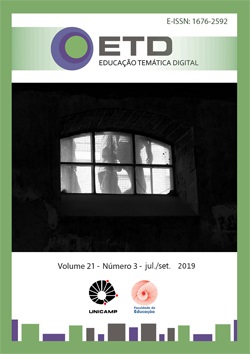Abstract
This article investigated the obstacles that high school students face when studying content related to genetic discipline. For this, we used as methodology the Grounded Theory that enabled us to elaborate an explanatory theory for the investigated phenomenon (the obstacles of the learning of genetics). Thus, we go through the three steps recommended by this Theory, which are: 1) Open Coding, which consists in naming the data (initial codes), taking into account the actions and processes of the individuals involved; 2) Axial coding, responsible for the agglutination of the initial codes in subcategories and analytical categories, and 3) Selective Codification, which consists in choosing among all the analyzed analytical categories the one with the ability to interlace all the others (central category). The Grounded Theory can be used to generate explanatory theories that, unlike the great formal theories, better explain the specific areas of empirical research since these theories emerge directly from real world data. Therefore, for this investigation, we elaborated the following Substantive Theory: "In order that the learning difficulties of the genetic concepts can be understood and overcome more easily by the students of the High School, is necessary the elaboration by the teacher of diverse strategies of teaching, through multiple theoretical-methodological approaches. Therefore, it is imperative that the genetics teacher reorient his pedagogical practice, modifying his teaching, trying to understand the complexity of the subjects, reflecting on what more appropriate way this knowledge can be transmitted so that effective learning can actually take place from the students".References
ARAÚJO, Von Borell; ESTRAMIANA, José Luis Álvaro. Ação e estrutura social em grounded theory: reflexões sobre uma psicologia social sociológica. Revista Interamericana de Psicología/Interamerican Journal of Psychology, v. 45, n.3, p. 381-394, 2011.
CASAGRANDE, Grasiela de Luca. A genética humana no livro didático de biologia. 2006. 121 f. Dissertação (Mestrado em Educação Científica e Tecnológica) - Universidade Federal de Santa Catarina, Florianópolis, SC, 2015.
CHARMAZ, Kathy. Constructing grounded theory: a practical guide through qualitative analysis. London: Sage, 2006.
CHARMAZ, Kathy. A construção da teoria fundamentada: guia prático para análise qualitativa. 2.ed. Porto Alegre: Artmed, 2009.
FLICK, Uwe. Introdução à pesquisa qualitativa. Porto Alegre: Artmed, 2009.
GIBBS, Graham. Análise de dados qualitativos. Porto Alegre: Vozes, 2009.
BAUER, Martin; GASKELL, George. Pesquisa qualitativa com texto, imagem e som: um manual prático. 2. ed. Rio de Janeiro: Vozes, 2002.
GOULDING, Cristina. Grounded theory: a magical formula or a potential nightmare. The Marketing Review. v. 2, n.1, p. 21- 34, 2001.
GLASER, Barney; STRAUSS Anselm. The discovery of grounded theory: strategies for qualitative research. New York: Aldine de Gruyter, 1967.
GLASER, Barney. Theoretical sensivity. Mill Valley: Sociology Press, 1978.
KRASILCHIK, Myriam. Prática de ensino de biologia. São Paulo: Edusp, 2004.
LONGDEN, Bernard. Genetics - are there inherent learn-ing difficulties? Journal of Biological Education, v. 16, n. 2, p. 135-140, 1982.
NASCIMENTO, Jonice Ferreira de Macedo. A genética se faz presente no vestibular da Universidade Federal de Santa Catarina. 2003. 162 f. Dissertação (Mestrado em Educação) - Universidade Federal de Santa Catarina, Florianópolis, SC, 2003.
PAIVA, Ana Luiza Bittencourt; MARTINS, Carmen Maria de Caro. Concepções prévias de alunos de terceiro ano do ensino médio a respeito de temas na área de Genética. Revista Ensaio, v.7, n.3, p.182-201, 2005.
SILVEIRA, Luís Fernando dos Santos. Uma contribuição para o ensino de genética. 2008. 116 f. Dissertação (Mestrado em Educação em Ciências e Matemática) - Pontifícia Universidade Católica de Porto Alegre, Porto Alegre, RS, 2008.
STRAUSS, Anselm; CORBIN, Juliet. Basics of qualitative research. Thousand Lage Daks: Lage, 1990.
STRAUSS, Anselm; CORBIN, Juliet. Pesquisa qualitativa: técnicas e procedimentos para o desenvolvimento de teoria fundamentada. Porto Alegre: Artmed, 2008.
TAROZZI, Maximilliano. O que é a grounded theory: metodologia de pesquisa e de teoria fundamentada nos dados. Petrópolis, RJ: Vozes, 2011.
THOMAS, Jeff. Learning about genes and evolution through formal and informal education. Studies in Science Education, v. 35, p. 59-92, 2000.
VALLE, Mariana Guelero. Argumentação na produção escrita de professores de ciências: implicações para o ensino de genética. 2009. 110 f. Dissertação (Mestrado em Educação) - Universidade de São Paulo, São Paulo, SP, 2009.
The ETD - Digital Thematic Education uses the Creative Commons license (CC), thus preserving the integrity of the articles in an open access environment.


